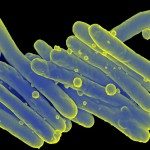Link to Pubmed [PMID] – 32034201
Sci Rep 2020 Feb;10(1):2112
Direct link to open access publication:
https://www.nature.com/articles/s41598-020-58967-8
Abstract
The fatty acid synthase type II (FAS-II) multienzyme system builds the main chain of mycolic acids (MAs), important lipid pathogenicity factors of Mycobacterium tuberculosis (Mtb). Due to their original structure, the identification of the (3 R)-hydroxyacyl-ACP dehydratases, HadAB and HadBC, of Mtb FAS-II complex required in-depth work. Here, we report the discovery of a third dehydratase protein, HadD (Rv0504c), whose gene is non-essential and sits upstream of cmaA2 encoding a cyclopropane synthase dedicated to keto- and methoxy-MAs. HadD deletion triggered a marked change in Mtb keto-MA content and size distribution, deeply impacting the production of full-size molecules. Furthermore, abnormal MAs, likely generated from 3-hydroxylated intermediates, accumulated. These data strongly suggest that HadD catalyzes the 3-hydroxyacyl dehydratation step of late FAS-II elongation cycles during keto-MA biosynthesis. Phenotyping of Mtb hadD deletion mutant revealed the influence of HadD on the planktonic growth, colony morphology and biofilm structuration, as well as on low temperature tolerance. Importantly, HadD has a strong impact on Mtb virulence in the mouse model of infection. The effects of the lack of HadD observed both in vitro and in vivo designate this protein as a bona fide target for the development of novel anti-TB intervention strategies.


